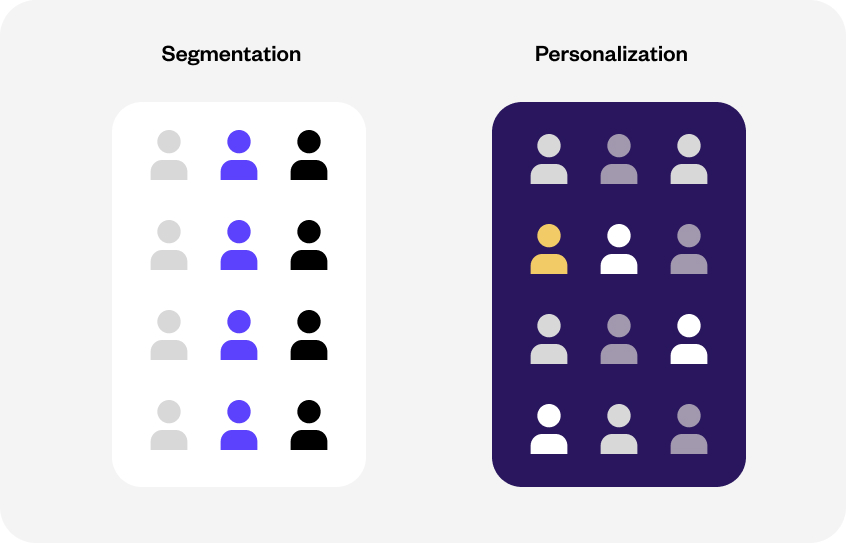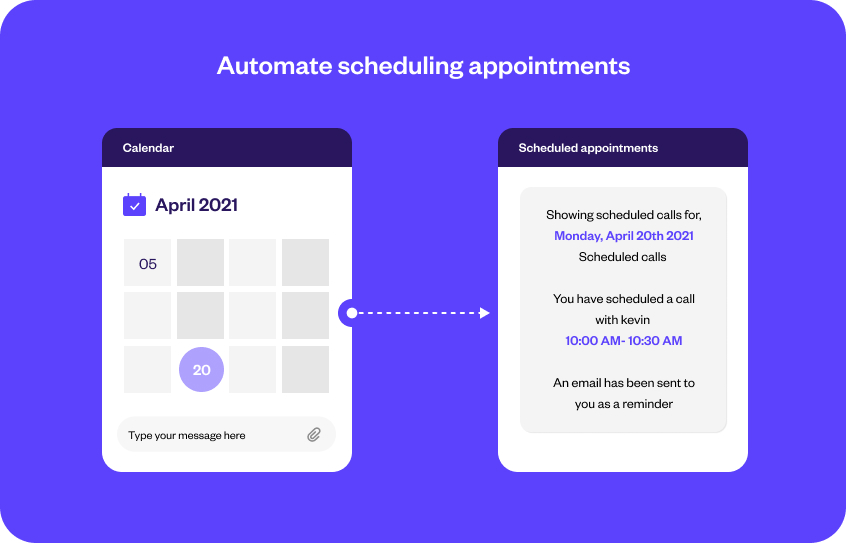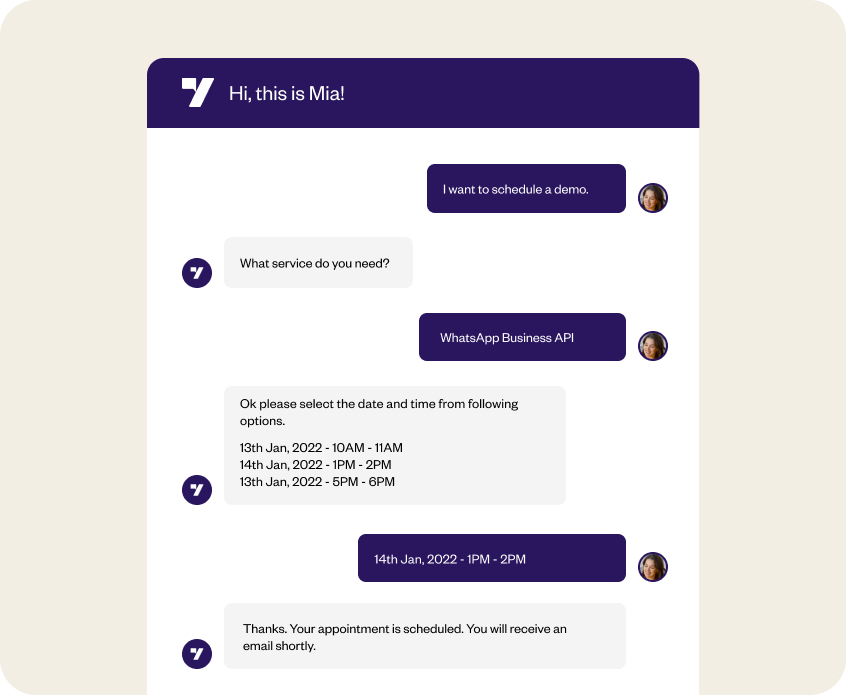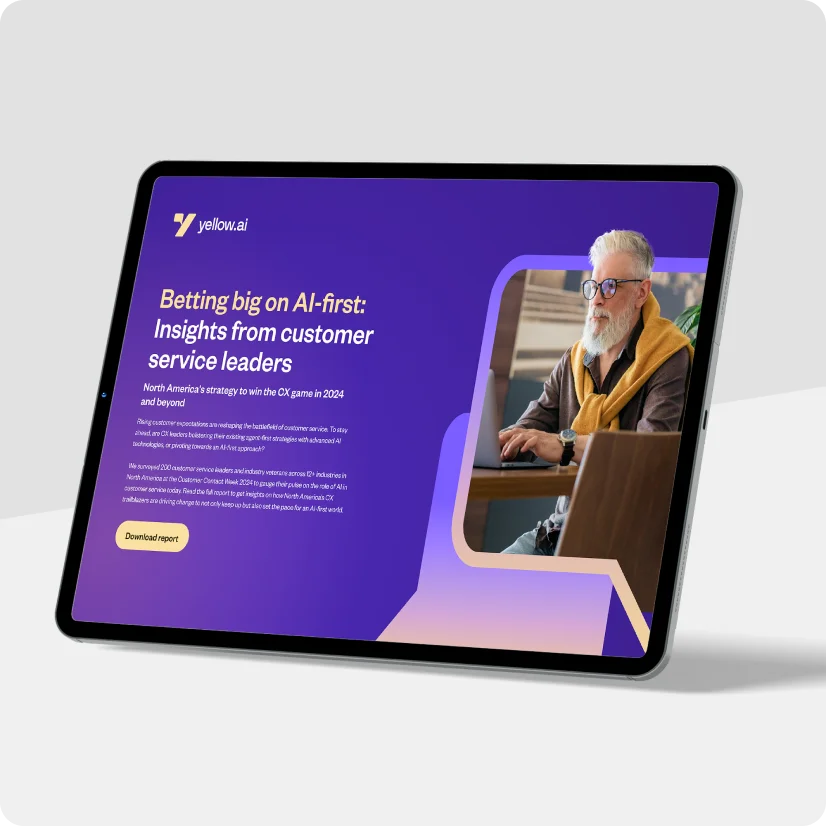In a rush and need the TL/DR version?
Summarize
Early digitally native brands (DNBs) initially relied on chatbots but soon realized their limitations in functionality, personalization, and human-like interaction. Enter conversational AI, a more advanced solution that understands customer needs, engages across various channels, and operates around the clock.
Conversational AI addresses key limitations of chatbots:
- Enhanced functionality: Handles complex queries and provides detailed responses.
- Human-like interaction: Delivers empathetic and personalized interactions, crucial for customer satisfaction.
- Improved personalization: Tailors responses based on user preferences, leading to better engagement.
Benefits of conversational AI for lead generation include:
- Higher quality leads: Over 55% of businesses report improved lead quality.
- 24/7 availability: AI agents engage customers at any time, ensuring seamless experiences.
- Cost efficiency: Reduces operational costs while boosting ROI through enhanced customer engagement and support.
Best practices for using conversational AI include understanding user personas, automating lead qualification and appointment scheduling, providing relevant content, and ensuring seamless handoffs to human agents when necessary. Yellow.ai’s platform empowers businesses to automate and personalize interactions, ultimately driving superior lead generation and customer satisfaction.
Note: This summary is not a substitute for reading the article in full, as you may miss out on important nuances.
In the fast-evolving landscape of digital lead generation, businesses strive to connect with potential customers across virtual platforms. It’s like embarking on a journey, where lead generation becomes the compass that guides modern sales and marketing teams to their goals. However, relying on traditional methods won’t suffice in this digital era. Early Digitally Native Brands (DNBs) sought refuge in chatbots, hoping for a remedy to their lead generation challenges. Unfortunately, chatbots fell short of delivering the desired support and customer experience.
But here’s where a new contender steps in – conversational AI. Think of it as the seasoned traveler, equipped with advanced technology and adept at meaningful conversations. Unlike chatbots, conversational AI has the ability to truly understand customers’ needs, engage them across various digital channels, and connect teams even across different time zones, and withe varied linguistic preferences.
Related must reads:
- Conversational AI in banking
- Conversational AI in healthcare
- Conversational AI in insurance
- Conversational AI in retail
The future of lead generation and conversational AI
We can’t predict the future, but the following data proves that lead generation by conversational AI is the future, and it is already here.
- 83% of digitally native companies believe that adopting new technologies, conversational AI included, will help spur their growth.
- 95% of employees believe that their organizations would benefit greatly by embedding AI into their operations, including lead generation, customer support, sales and marketing.
- 83% of business managers currently use or have plans to deploy AI and ML within the next three to five years.
- 73% of business leaders revealed that customer service is the leading application for conversational AI, closely followed by sales and marketing.5. 46.9% of American adults will interact with a conversational AI assistant in 2022. That number will increase to 48.2% by 2025.
This means conventional lead generation practices won’t cut it. In response to this pressure, early DNBs (digitally native brands) turned to chatbots as the preferred solution for lead generation and nurturing. However, chatbots have historically struggled to provide the top-class support and experience that brands and customers expect. Why? Here are three big reasons.
1. Limited functionality
Traditional chatbot solutions are designed to answer basic questions, with each response based on a script. Because their responses are limited, these chatbots are unable to answer complex, multipart queries that require deeper understanding and decision-making. For customers seeking support, traditional chatbots are merely frontline tools that often don’t deliver resolution. Thus, they are forced to go through more steps to get the answers they need to move forward and make a decision.
2. Lack of human interaction
According to PwC, 64% of US consumers feel that brands fail to deliver that human element in the customer experience. In a different study, 65% of customers still prefer talking to human support over chatbots. It’s clear that human interaction remains a premium driver for most customers, mainly because human connection translates to empathy.
Empathy from brands shows customers that they are valued and loved. Traditional chatbots are not capable of understanding the nuances of human conversation and emotions. This means that traditional chatbot platforms can’t engage customers at a deeper level where empathy plays a crucial role in customer experience and satisfaction.
3. Inability to personalize
Modern customers expect brands to deliver personalized service at any contact point and throughout their journey. Chatbots are limited to scripts and simple decision trees, thus customers are provided with generic responses.
Companies that excel at personalization enjoy 40% more revenue than those that don’t. As chatbots serve as the first line of customer interaction, their inability to deliver personalized experiences can lead to poor customer experience and substantial loss of revenue.
Conversational AI: Filling the gap
Today consumer expectations have reached new heights when it comes to engaging with brands. Conversational AI has emerged as a vital technology for DNBs, with 69% of them adopting advanced AI capabilities. In a fiercely competitive market, the level of AI maturity has become the distinguishing factor between high-growth DNBs and those lagging behind in the digital realm.`
Conversational AI integrates cutting-edge technologies like artificial intelligence, speech recognition, natural language processing (NLP), and machine learning (ML). This powerful combination enables DNBs to initiate and foster more impactful interactions, driving enhanced engagement on a larger scale across diverse users and platforms. As a result, DNBs are increasingly transitioning from basic chatbot solutions to robust conversational platforms that empower their lead-generation efforts.
The growing prominence of conversational AI reflects the recognition that brands must embrace advanced technologies to meet the evolving demands of their digitally-savvy customers. By leveraging the capabilities of conversational AI, DNBs can forge deeper connections with their target audience, deliver personalized experiences, and gain a competitive edge in the digital landscape.
Why is conversational AI important to your lead-generation strategy?
Successful communication is the key to any growing business. Clearly, a company that communicates effectively during the initial interaction with a potential customer typically wins the game. Deploying conversational AI at the frontline gives digital native brands the opportunity to build a positive perspective in customers’ minds from the get-go.
Conversational AI agents can engage and interact with customers at any time of the day, thanks to their 24/7 availability. These solutions deliver powerful customer engagement across a plethora of channels, devices and platforms, providing digital native consumers convenient options while delivering seamless and consistent experiences.
More than half (55%) of businesses that use conversational AI for lead generation have generated more high-quality leads. DNBs typically have smaller human support teams and are prone to missing leads during interactions and engagements with customers. Conversational AI agents, on the other hand, are unrivaled when it comes to connecting and engaging with prospects. Humans may miss a lead opportunity, but conversational AI agents cannot.
There are a number of reasons to use conversational AI technology, and all of them revolve around one thing: effective communication. Specifically, in terms of lead generation, businesses should use conversational AI because it brings:
1. Qualifying leads and improving conversion rates
Qualifying leads can be accelerated through the use of dynamic AI agents, minimizing or eliminating the need for human involvement. Automation allows businesses to filter leads before they enter the sales funnel by implementing a predetermined set of qualifying questions.
Moreover, conversational AI agents provide end-to-end communication automation for the entire sales cycle, starting from creating awareness to ensuring customer delight. These AI agents support customers at every stage of their journey, regardless of its duration.
With Yellow.ai’s advanced multi-LLMs and generative AI-powered Conversational Commerce Cloud sales and marketing experts can generate high-quality leads, boost lead conversions, get a 360° user profile, while cutting costs by 60%.
2. Scaling business by maximizing ROI
Conversational AI is a powerful tool that can significantly boost ROI for businesses. Firstly, it enhances customer engagement and satisfaction by delivering personalized interactions and timely support. By understanding user preferences and providing relevant information, conversational AI nurtures prospects along the customer journey, increasing the likelihood of conversion and repeat business. Moreover, it streamlines customer support processes, reducing the workload on human agents. This operational efficiency translates to cost savings and allows businesses to handle a higher volume of customer inquiries, leading to improved ROI.
Secondly, conversational AI optimizes lead generation efforts. Through real-time interactions, it captures valuable data on customer preferences, pain points, and buying behavior. Armed with this information, businesses can fine-tune their marketing strategies, target audiences more effectively, and allocate resources efficiently. Additionally, conversational AI’s ability to engage customers across multiple platforms ensures a broader reach and more comprehensive lead generation approach.
Case study: How Sephora gained $30K avg. incremental revenue earned every month using conversational AI
3. Improving CSAT scores by promoting better customer engagement
Conversational AI drives better customer engagement by enabling personalized and interactive interactions. It facilitates natural language conversations, understands user intents, and provides relevant and timely responses. With conversational AI, businesses can offer proactive assistance, personalized recommendations, and seamless user experiences. By engaging customers in meaningful conversations, addressing their needs promptly, and delivering tailored solutions, conversational AI enhances customer satisfaction, fosters deeper connections, and ultimately drives better engagement with the brand.
You can unlock your business’ full potential using Yellow.ai’s omnichannel AI automation platform. It aids in driving captivating conversations that feel personalized and tailored to your customers’ needs across 35+ channels. Additionally, Yellow.ai empowers you to provide a seamless and consistent customer experience, fostering engagement that goes beyond transactional interactions.
Case study: Yellow.ai & Rajmandir Hypermarket: Improving user engagement with goal-oriented omnichannel campaigns
Lead generation success: Best practices for harnessing conversational AI
Traditionally, acquiring leads is more expensive than converting the leads that you already have. Using conversational AI for lead generation can significantly reduce the cost and effort that goes behind attracting customers to the top of the funnel.
Let us illustrate the use cases of conversational AI for lead generation and how businesses should go about integrating them into their strategy.
1. Understand and create user personas
The foremost factor while strategizing for lead generation is understanding your target audience and identifying user personas based on demographics, interests, geography, occupation, and other factors. Using this information, a dynamic AI agent can better qualify leads.
By automating customer surveys using thoughtfully crafted questions, businesses can focus their efforts on nurturing the most promising leads with the highest chances of converting. During these interactions, conversational AI agents become experts at analyzing every touchpoint, deciphering the true meaning and intent behind customer responses. They intelligently segment leads based on their fit with the company’s products and services, ensuring that valuable resources are directed where they matter most. With conversational AI as your ally, you can elevate your lead-nurturing game and drive meaningful conversions.
2. Segmentation and personalization

Once you have qualified leads at your disposal, it’s time to segment the list of potential customers. This task can also be automated using conversational AI.
Using segmentation along with conversational AI agents, companies can personalize their marketing messages to their customers’ mindsets.
For example, if a customer is Jewish and wants to buy a Hanukkah candle holder, segmentation will make the dynamic AI agent understand that the company is not supposed to upsell its famous decorated Christmas tree to this customer.
A personalized list of Hanukkah preparations can be promoted instead. Customers feel loved with such personalization and stay with the brand longer.
3. Simplify the process of collecting user details
Most users feel that filling out a form is tedious and usually try to opt out. Conversational AI simplifies the process and enables customers to share their details without much effort.
- Create conversations that feel natural and engaging for users, guiding them through a step-by-step process to collect information gradually.
- Provide helpful suggestions and real-time validation to ensure accuracy and ease. Make it convenient for users by offering multiple channels for data submission.
- Respect their privacy and security concerns by clearly communicating how their information will be used and protected.
- Seamlessly integrate conversational AI with your existing systems, ensuring smooth data transfer and maximizing its value.
By embracing these user-centric practices, businesses can simplify the process of collecting user details, leading to higher data quality, user satisfaction, and valuable insights.
4. Automate scheduling appointments

Converting warm leads into potential customers is the basic functionality in sales. Once leads are qualified, the conversational AI agent can schedule appointments instantly and automatically. This feature gives companies an edge over their competitors by giving customers a zero-effort process of conversion.
By pushing the leads forward, conversational AI agents also help the sales team by doing the mundane tasks of scheduling appointments at the customers’ convenience. This also helps reduce sales churn, as reps can dedicate more time to having meaningful conversations.
5. Pushing relevant content and educating the audience
The aim of content marketing is to provide relevant content to future customers exactly when they need it. There’s no better time to engage with potential buyers as they are looking for information on your products or services.
Based on the queries of prospects, conversational AI must be able to share relevant product knowledge with the customers. Educating customers naturally pushes them further along the sales funnel and validates your services in their minds.
Also, it is a great way to market your content and ask customers to share the knowledge once they like it.
6. Seamless agent handoffs

In case of complex queries in regards to products or services, leads can easily get in touch with human personnel. The use of conversational AI for lead generation won’t replace humans, but will definitely streamline tasks for employees and helps them increase their productivity.
Tasks that require human intervention are seamlessly transitioned to a human agent. It provides all the data and information about the history of the customer. Also, it provides the human agent with the data and context regarding the interactions so that the human agent knows everything that has been going on.
7. Generate leads even when you’re offline
Conversational AI agents are never offline. On a public holiday, or after hours, by leveraging conversational AI, businesses can maintain lead generation efforts even during offline hours, capturing valuable information and potential customers for future follow-ups. This means you don’t just attend to prospects at your convenience but also when they are ready and available for interactions like this. Here are some things you can do:
- Pre-qualify leads: Set up your conversational AI to engage with website visitors proactively. By asking qualifying questions, the AI can identify potential leads and capture their information even when there are no human agents available.
- Offer offline messaging: Provide an option for users to leave messages or inquiries when the AI is offline. Collect contact details and specific requirements from these messages to follow up later.
- Utilize opt-in forms: Implement AI-powered opt-in forms that pop up on your website or mobile app when visitors take specific actions, such as spending a certain amount of time on a page or scrolling through product listings. These forms can collect contact information and preferences for future engagement.
- Email and SMS follow-ups: Have your conversational AI send automated follow-up emails or SMS messages to the leads captured during offline hours. Personalize the messages based on the information collected, such as their interests or the products they were looking at.
8. Reduce bounce rate
Prevent potential buyers from quickly leaving your website. Using conversational AI and engaging with customers during their time on your site can help reduce bounce rates.
Conversational AI improves lead generation and increases conversion rates up to 25%. Businesses that are using conversational AI for lead generation today are starting to see a competitive advantage.
Bolster lead generation for your business with Yellow.ai
Conversational AI is a pivotal, disruptive, and next-gen technology that’s already making an impact across different business industries. Yellow.ai provides digital brands the AI platform they need to automate lead generation and drive conversations, and ultimately, accelerate customer journey to revenue.
Yellow.ai’s dynamic AI agents automate conversations 24/7 and can scale to meet increasing volumes of requests and calls. Supporting more than 100 languages and deployable across 35-plus text and voice channels, our AI agents provide digital enterprises with the consistent and reliable omnichannel presence they need to give customers superior real-time engagement for higher returns.
Compared to traditional form fills, our AI agents collect user information through casual conversations and map prospect activity, and discern customer intent accurately for future campaigns, all thanks to our proprietary DynamicNLPTM engine and generative-powered Dynamic Automation Platform.
Dynamic AI agents can direct site visitors with intent-triggered suggestions. Users can identify the intent behind a visitor’s journey on their site and direct them to the solutions they are interested in with timely suggestions for faster conversions.
With Yellow.ai, customers have multiplied their revenue manifold and seen the difference within just two weeks of deploying conversational AI. Read our customer success stories right here!















